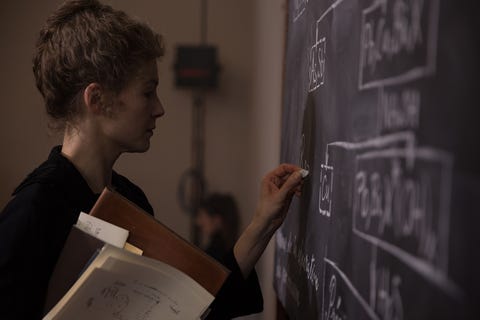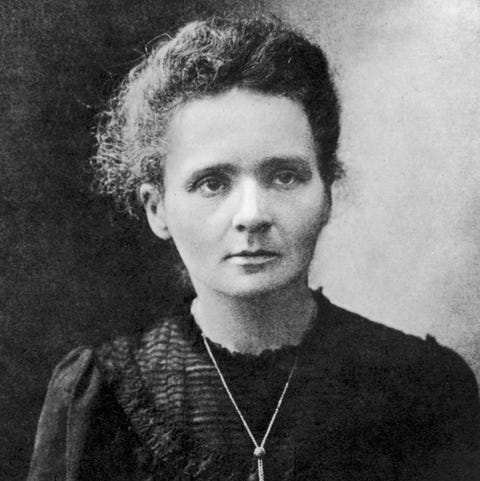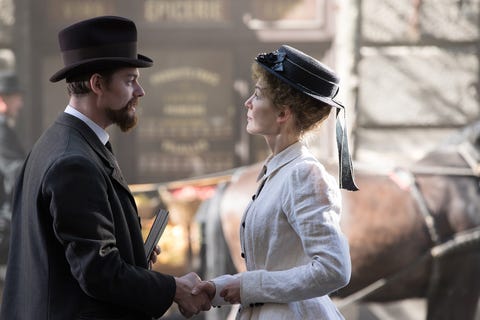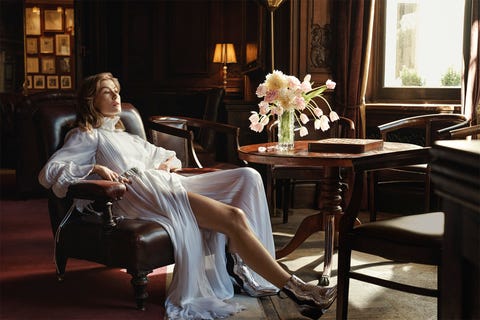"It shows her as a passionate woman, we can be quick to think of scientists as sexless," says the star of the new film Radioactive.

© 2019 STUDIOCANAL SAS AND AMAZON CONTENT SERVICES LLC
BY ADAM RATHE JUL 26, 2020
For many of us, Marie Curie—the Polish-born scientist who developed the theory of radioactivity and became the first woman to win the Nobel Prize and then the first person to win the prize twice—exists only in history books. Her work may impact our lives to this day, but her status as a kind of scientific superstar has remained widely unknown. That is, until now.
In the new movie Radioactive (streaming beginning July 24 on Amazon), Rosamund Pike plays Curie to near perfection. The film, directed by Marjane Satrapi, follows Curie from her childhood through the end of her life and allows for a complicated, layered portrayal of her not only as a scientist but a wife, a mother, a widow, an outcast, and eventually an icon.
An early review called Pike—who appeared on the cover of Town & Country in 2018 for her role in A Private War—“luminous” and noted that the Gone Girl star “fiercely and movingly plays Curie in all her glory and heartbreak.”

Rosamund Pike as the Nobel Prize–winning scientist Marie Curie in the new film Radioactive, out July 24 on Amazon.] LAURIE SPARHAM
While Pike took chemistry lessons to prepare to play Curie, there were parts of the character that proved a bit trickier, like her relationship with the early 1900s Parisian spiritualism craze or her affair with the scientist Paul Langevin, which caused a scandal in its time. Here, the actress describes what drew her to Curie and the lasting impact of the role on her own life.
Marie Curie’s known for her scientific work but watching Radioactive, it’s clear her life was fascinating in areas beyond just her profession.
The potency of her as a figure is so connected to the science, and the fact that it’s radioactivity that she’s linked with has led to a caution in the way we regard her. When she and Pierre Curie [her husband and partner] discovered radium, it glowed and seemed so enchanting and romantic; people wanted it in face creams and chocolate and cigarettes, and it felt like the spirit of a new age. She seemed like a magical figure, but as people realized the dangers—France was approaching war, her husband died, and she began this affair and was shunned—she was suddenly a foreigner again, having previously been one of their own. I’m sure it’s kind of linked to people’s ambivalence about what she discovered.

Curie, seen here in 1911, won two Nobel Prizes for her work in chemistry—including developing the theory of radioactivity. TIME LIFE PICTURESGETTY IMAGES
Curie also had this complicated partnership with her husband, an involvement with the occult, and also a relationship with Paul Langevin. It’s a much bigger picture than just her work.
So many scientists at the time were embracing spiritualism—and felt that science and spiritualism could go hand in hand. She was very suspicious of it, but her husband, who was a very open-minded person, was interested. They’re all working in the field of energy though, and thinking about those circles; what happens when someone dies and where does their energy go? Now people think spirituality in the traditional sense has eroded in the form of churchgoing and has been replaced with concepts like meditation. People are always looking for some form of spirituality, it just takes different forms.
I heard you took chemistry lessons to prepare for the role.
It’s logical isn’t it? You’d want to so you could know what she might be thinking and the context in which she was working. Her discovery didn’t come out of a vacuum, so I thought it was important to know what the ideas were, what people were working on.

Pike and Sam Reilly, who plays Pierre Curie, Marie’s husband and collaborator, in a still from Radioactive. LAURIE SPARHAM
Were there parts of the role that made preparation more difficult?
Her relationship with Paul, which I resisted for a long time… I was so convinced by the power of her connection with Pierre. She was a woman who was so resistant to collaboration, be it romantic or scientific, and the fact that Pierre Curie with all of his open-minded, generous humanism convinced her they could work together—the love she came to feel for him was so profound, and I felt it strongly. Studying pictures of her, I see the loss. I can tell if pictures of her are from after his death or before because her face to me looks different. I’ve had a hard time when documentaries have tried to place significance on her relationship with Paul; I didn’t buy it. I know it was sensationalized in the press, but I think actually she had the affair because Paul was the one person who fully understood what she lost. He was the other person who had worked as closely with Pierre as she had. Their relationship wasn’t a great love affair, and after they broke it off and the storm had blown over, they continued working together. I’m more interested that it shows her as a passionate woman. We can be quick to think of scientists as sexless.
What surprised you about Marie?
She had this eccentricity, which I found very appealing. It’s the directness and lack of filter that I find very charming. It puts you at risk of being rejected, not liked, or shut out, but she carried on and made her own place, not heeding what others thought. Also, her relationship with her daughter [Irène, who would later win a Nobel Prize in chemistry herself]; she was not a good mother, but a tremendous respect existed between them and they were both brilliant scientists in their own right. It’s hard to untangle her now. I think back on her life as something I’ve experienced rather than something I’ve acted in.

Rosamund Pike, shot for Town & Country in 2018, starred in films including Gone Girl and A Private War before appearing in the new Radioactive.LIZ COLLINS
This film is coming out in a time when scientists are in the spotlight again. Is there something about her life that feels especially important to you in this moment?
We didn’t know this seismic event was coming and the whole world would be brought together thinking about science again. It’s a good moment for the film because we are thinking about the cost of science and the responsibilities we have when they put their work into the world—can we trust humanity to use it only for good? In recent weeks, everybody’s been reevaluating their relationship to race and started to try to educate themselves more on other people’s experiences. If that’s the climate this film is coming into, we’re all more open to receiving stories about people who are different from ourselves. Marie Curie fought hard against structures of the white, male brotherhood that were running science, but nonetheless she had an easier time of it than if she hadn’t been white or educated.
We didn’t know this seismic event was coming and the whole world would be brought together thinking about science again. It’s a good moment for the film because we are thinking about the cost of science and the responsibilities we have when they put their work into the world—can we trust humanity to use it only for good? In recent weeks, everybody’s been reevaluating their relationship to race and started to try to educate themselves more on other people’s experiences. If that’s the climate this film is coming into, we’re all more open to receiving stories about people who are different from ourselves. Marie Curie fought hard against structures of the white, male brotherhood that were running science, but nonetheless she had an easier time of it than if she hadn’t been white or educated.
Have those chemistry lessons stuck with you?
There are things that have come up during the pandemic in the education of my children and running a home school. I had that curiosity before, but now it has new applications.
No comments:
Post a Comment